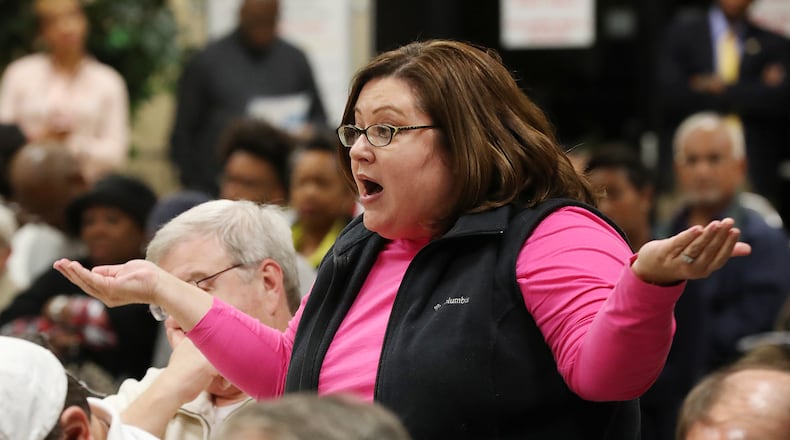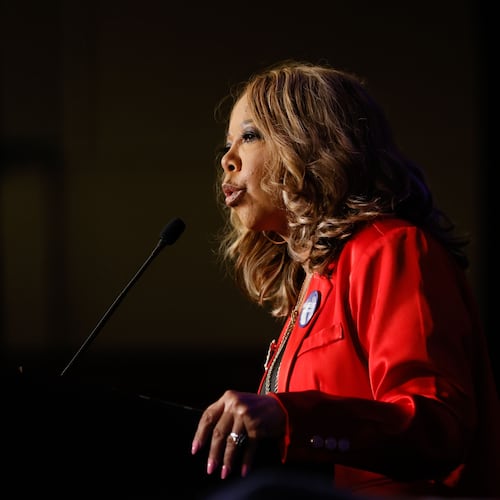Strap in. The steady flow of outrageous, inexplicable, inflated water bills in DeKalb County likely will continue for a while.
Despite contentious town hall meetings and protests, problems persist, as thousands of residents have been hit with exorbitant bills.
It’s now becoming clear the problem is so big that it could take three years and tens of millions of dollars to fix.
Most of the county’s 190,000 old water meters need to be replaced. Modern billing software needs to be purchased. More customer service representatives and field technicians need to be hired and trained.
In addition, the county is still working to verify the accuracy of 29,000 bills that were never mailed; another 8,000 withheld since last year were recently validated and sent.
Some of the affected customers say they're disappointed by the pace of changes and the lack of a more clearly articulated timeline from DeKalb CEO Mike Thurmond, who took office Jan. 1.
“It’s hard to have any confidence when you’ve seen so much ineptitude, mismanagement and lack of trust from customers that they’re telling the truth,” said Gaye Stathis, a Brookhaven resident whose water and sewer bill shot up to $800 last fall. “I have a lot of better things to do in my daily life than deal with this.”
So far, Thurmond has focused on addressing the most immediate issues: correcting thousands of backlogged bills and improving customer service.
He said the billing crisis is his top priority and fixing it probably will take most of his four-year term.
“We are making significant progress,” Thurmond said. “The solution is not a single event but a process that we are committed to following.”
During a town hall meeting this month, Thurmond outlined more than a dozen reasons for billing errors, from malfunctioning meters to employees who estimated water consumption instead of actually reading meters. In other cases, meters were improperly installed and data was incorrectly entered into billing systems.
Some residents said Thurmond is telling them what they already know.
Leah Salby, a Decatur resident who describes herself as a consumer advocate, said the county needs to take definitive action rather than reviewing the root causes of problems that have existed for years already.
“There’s no written commitment to improving. Everything is just lip service,” said Salby, who hasn’t experienced inflated bills at her home. “They’ve said all these things before. Everything needs to be audited and watched under a microscope.”
But replacing a such a large, flawed water and sewer billing system will take time.
Many of the county’s proposals are designed to remove human errors and make its billing system more automated, so that water meters wirelessly transmit consumption data to the county’s computers and irregularities can be discovered more quickly.
The first steps are already in motion. A $275,000 audit, which will review underlying problems and recommend corrections, is scheduled for completion in June.
The county is reviewing bids from companies for a new computer billing system, which will provide more information for customer service representatives and customers. The cost of changing from the current billing software, which was installed in 2004, won’t be known until the DeKalb Commission votes on a contractor this summer.
Then, DeKalb’s government plans to begin replacing about 113,000 residential water meters that have reached the end of their life cycle and are prone to inaccuracies. At $100 per meter, that effort will cost at least $11.3 million, plus labor and installation. In addition, about 30,000 meters with potential defects likely could be switched out at no cost because they’re under warranty.
In the meantime, DeKalb Commissioner Nancy Jester said residents are worried that they’ll receive expensive charges for old bills once the government finally verifies their accuracy and mails them in the coming months. She may introduce legislation that would prevent the county from excessively back-billing residents.
“I get that it’s going to take time” to resolve all of the county’s billing problems, she said. “However, we have to be communicating on an ongoing basis. We’re not there. There’s fear from residents saying, ‘Am I going to get this big bill?’”
Even if everything goes according to plan, all the water meter, billing and customer service upgrades won’t be finished until sometime in 2020. Then, residents will receive bills monthly instead of every other month, and they should almost always be correct, according to the county.
“It requires some objectivity and patience. But if I’m a customer, I’m not that patient right now,” Thurmond said. “I understand that. We’ve just got to get the job done. There’s no way to defend it, but I do have to correct it.”
DeKalb water billing proposed fixes
- Audit billing inaccuracies and make recommendations. Status: Completion in June.
- Replace billing software. Status: Bids have been submitted and DeKalb Commission will vote on a contractor.
- Replace more than 113,000 water meters. Status: The county will solicit bids by July.
- Hire customer service representatives: Status: Twelve hired so far this year, five more positions to be filled before end of summer to bring total staff to 50.
- Hire field service technicians: Status: Eleven hired so far this year, 15 more positions to be filled by end of 2017 to bring total staff to 46.
- Install water tower antennas to wirelessly transmit consumption data. Status: Completed at a cost of $1.95 million.
- Replace 10 percent of service lines from water mains to meters. Status: Bids will be solicited by end of 2017
Source: DeKalb County
About the Author
Keep Reading
The Latest
Featured




